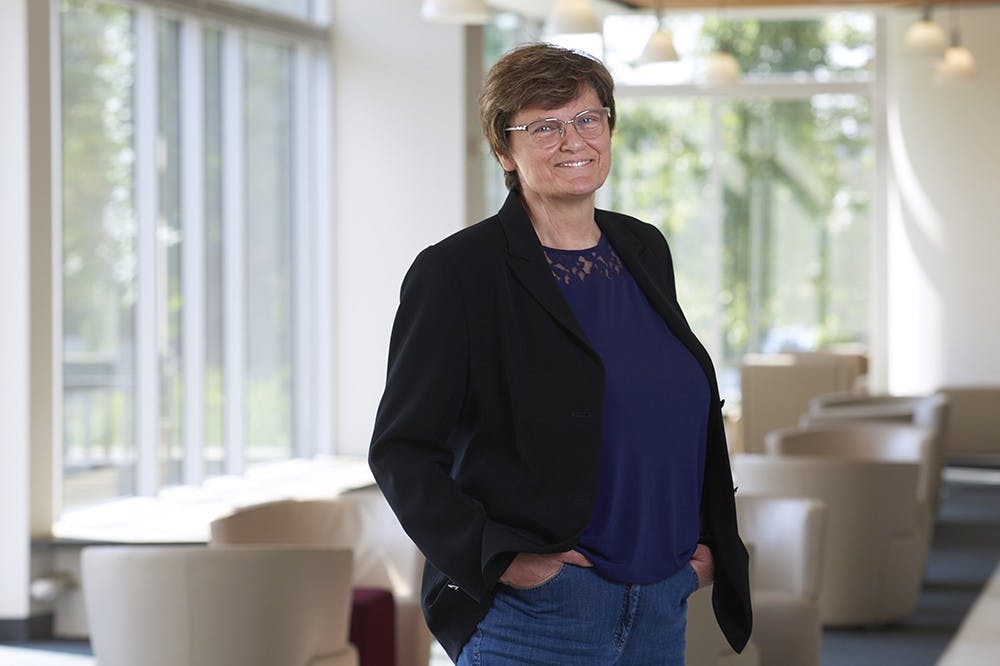Perelman School of Medicine professor Katalin Karikó was awarded the 2022 Solvay Prize for her research on messenger RNA, which laid the groundwork for the development of COVID-19 vaccines.
The Science for the Future Solvay Prize ceremony is held in Brussels to honor scientific discoveries that have significantly advanced the field of chemistry and helped resolve global challenges. Every two years, an international jury of leading scientists selects one researcher to receive a reward of 300,000 euros, or approximately $325,000.
This year's conference — the fifth ever —was held on March 29. Karikó was praised by Solvay CEO Ilham Kadri for “truly reinventing scientific progress."
“What struck me most … was her determination and resilience, but also humility. Even when many in the scientific community didn’t see the potential, … even when many of her experiments failed, she never gave up,” Kadri said during the ceremony. “This incredible breakthrough has quite simply changed the world. She is an inspiration for me and the next generation.”
Karikó, who is currently a professor of Neurosurgery at Penn as well as the senior vice president of BioNTech, spent decades investigating the use of transcribed mRNA — a form of genetic material that the cells in an individual’s body can utilize to produce proteins — in protein therapy.
In the past, when doctors administered RNA, it often caused inflammatory side effects in the patients' immune systems. In 2005, Karikó, along with Penn Medicine colleague Drew Weissman, discovered how modifying nucleosides in mRNA can make it non-immunogenic, which therefore reduces the side effects of mRNA infusions and widens the potential for mRNA-based therapeutics.
Scientists used this breakthrough technology to develop the Moderna and Pfizer COVID-19 vaccines, which use a small piece of mRNA to teach the body how to make a protein from the virus, generating an immune response that gives people a high degree of immunity. In the future, the same technology could potentially be used to treat diseases like cancer, influenza, malaria, and HIV.
At the conference, European Commissioner for Innovation, Research, Culture, Education, and Youth Mariya Gabriel said that Karikó’s work was “the perfect example of the great persistence to walk through from early ideas to mature technologies that change the lives of millions of people.”
RELATED:
Penn Medicine's Drew Weissman, Katalin Karikó receive $3 million VinFuture Grand Prize
Penn professors receive prize for mRNA research that led to creation of COVID-19 vaccines
Sven Lidin, president of the Solvay Prize jury, added that months of deliberation during the selection process led to the consensus that Karikó’s “inspiration, ingenuity, and perseverance has been instrumental in bringing the RNA vaccines to fruition at a time when the world needed it most.”
Karikó presented a brief lecture about her research at the ceremony and advised attendees to always think positively, never comparing themselves to others during their scientific journeys. She added that because of the low production costs associated with RNA-based therapeutics, she sees her work as an “equalizer” that could allow patients to receive treatments that were previously less affordable.
“I am thrilled and honored by this recognition,” Karikó said. “I look back on my long journey with gratitude to all those who helped me to get there: my supportive family, my inspirational teachers, mentors, and colleagues.”
Prior to the ceremony, Karikó took part in a press conference where she discussed her breakthrough research on mRNA and the importance of science in everyday life.









